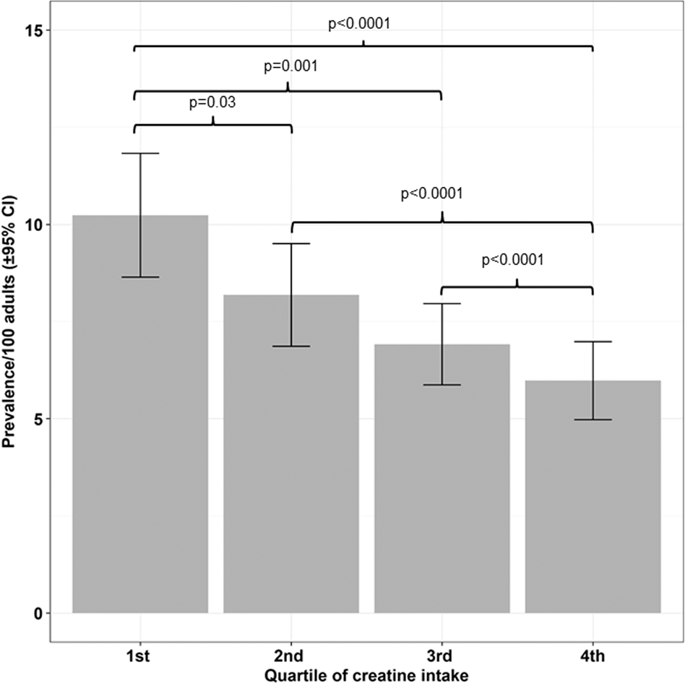当前位置:
X-MOL 学术
›
Transl. Psychiaty
›
论文详情
Our official English website, www.x-mol.net, welcomes your
feedback! (Note: you will need to create a separate account there.)
Dietary creatine intake and depression risk among U.S. adults.
Translational Psychiatry ( IF 5.8 ) Pub Date : 2020-02-03 , DOI: 10.1038/s41398-020-0741-x Amanda V Bakian 1 , Rebekah S Huber 1 , Lindsay Scholl 1 , Perry F Renshaw 1, 2 , Douglas Kondo 1, 2
Translational Psychiatry ( IF 5.8 ) Pub Date : 2020-02-03 , DOI: 10.1038/s41398-020-0741-x Amanda V Bakian 1 , Rebekah S Huber 1 , Lindsay Scholl 1 , Perry F Renshaw 1, 2 , Douglas Kondo 1, 2
Affiliation

|
Creatine monohydrate is actively being researched for its antidepressant effects, yet little is known about the link between dietary creatine and depression risk. This study examines the association between dietary creatine and depression in U.S. adults, using data from the 2005 to 2012 National Health and Nutrition Examination Survey (NHANES). Patient health questionnaire, dietary creatine intake and covariates were obtained on 22,692 NHANES participants ≥20 years of age. Depression prevalence was calculated within quartiles of dietary creatine intake. Adjusted logistic regression models were formulated to determine the relationship between dietary creatine intake and depression risk. Additional covariates included income to poverty ratio, race/ethnicity, sex, age, education level, body mass index, healthcare access, smoking status, physical activity, and antidepressant/anxiolytic medication use. Models were further stratified by sex, age group, and antidepressant/anxiolytic medication use. Depression prevalence was 10.23/100 persons (95% CI: 8.64-11.83) among NHANES participants in the lowest quartile of dietary creatine intake compared with 5.98/100 persons (95% CI: 4.97-6.98) among participants in the highest quartile (p < 0.001). An inverse association was measured between dietary creatine and depression (adjusted odds ratio (AOR) = 0.68, 95% CI: 0.52-0.88). Dietary creatine's negative association with depression was strongest in females (AOR = 0.62, 95% CI: 0.40-0.98), participants aged 20-39 years (AOR = 0.52, 95% CI: 0.34-0.79) and participants not taking antidepressant/anxiolytic medication (AOR = 0.58, 95% CI: 0.43-0.77). Study results indicate a significant negative relationship between dietary creatine and depression in a nationally representative adult cohort. Further research is warranted to investigate the role creatine plays in depression, particularly among women and across the lifespan.
中文翻译:

美国成年人饮食中肌酸的摄入和抑郁风险。
肌酸一水合物的抗抑郁作用正在积极研究中,但是人们对饮食肌酸与抑郁风险之间的联系知之甚少。这项研究使用2005年至2012年国家健康与营养检查调查(NHANES)的数据,研究了美国成年人饮食中肌酸与抑郁之间的关系。在22,692名NHANES≥20岁的参与者中获得了患者健康调查表,饮食中的肌酸摄入量和协变量。在饮食肌酸摄入量的四分位数内计算抑郁症患病率。建立了调整后的逻辑回归模型,以确定饮食中肌酸摄入量与抑郁风险之间的关系。其他协变量包括收入与贫困率,种族/民族,性别,年龄,受教育程度,体重指数,医疗保健机会,吸烟状况,体育锻炼和抗抑郁/抗焦虑药的使用。根据性别,年龄组和抗抑郁/抗焦虑药物的使用情况进一步对模型进行分层。饮食肌酸摄入量最低的四分位数的NHANES参与者的抑郁症患病率为10.23 / 100人(95%CI:8.64-11.83),而饮食水平最高的四分位数的参与者为5.98 / 100人(95%CI:4.97-6.98)(p <0.001)。饮食中的肌酸和抑郁症之间呈负相关(校正比值比(AOR)= 0.68,95%CI:0.52-0.88)。饮食中肌酸与抑郁的负相关性最强的是女性(AOR = 0.62,95%CI:0.40-0.98),年龄在20-39岁的参与者(AOR = 0.52,95%CI:0.34-0.79)和未服用抗抑郁药/抗焦虑药的参与者药物(AOR = 0.58,95%CI:0.43-0.77)。研究结果表明,在全国有代表性的成年人群中,饮食肌酸与抑郁之间存在显着的负相关关系。有必要进行进一步的研究来调查肌酸在抑郁症中的作用,尤其是在女性中以及整个寿命过程中。
更新日期:2020-02-03
中文翻译:

美国成年人饮食中肌酸的摄入和抑郁风险。
肌酸一水合物的抗抑郁作用正在积极研究中,但是人们对饮食肌酸与抑郁风险之间的联系知之甚少。这项研究使用2005年至2012年国家健康与营养检查调查(NHANES)的数据,研究了美国成年人饮食中肌酸与抑郁之间的关系。在22,692名NHANES≥20岁的参与者中获得了患者健康调查表,饮食中的肌酸摄入量和协变量。在饮食肌酸摄入量的四分位数内计算抑郁症患病率。建立了调整后的逻辑回归模型,以确定饮食中肌酸摄入量与抑郁风险之间的关系。其他协变量包括收入与贫困率,种族/民族,性别,年龄,受教育程度,体重指数,医疗保健机会,吸烟状况,体育锻炼和抗抑郁/抗焦虑药的使用。根据性别,年龄组和抗抑郁/抗焦虑药物的使用情况进一步对模型进行分层。饮食肌酸摄入量最低的四分位数的NHANES参与者的抑郁症患病率为10.23 / 100人(95%CI:8.64-11.83),而饮食水平最高的四分位数的参与者为5.98 / 100人(95%CI:4.97-6.98)(p <0.001)。饮食中的肌酸和抑郁症之间呈负相关(校正比值比(AOR)= 0.68,95%CI:0.52-0.88)。饮食中肌酸与抑郁的负相关性最强的是女性(AOR = 0.62,95%CI:0.40-0.98),年龄在20-39岁的参与者(AOR = 0.52,95%CI:0.34-0.79)和未服用抗抑郁药/抗焦虑药的参与者药物(AOR = 0.58,95%CI:0.43-0.77)。研究结果表明,在全国有代表性的成年人群中,饮食肌酸与抑郁之间存在显着的负相关关系。有必要进行进一步的研究来调查肌酸在抑郁症中的作用,尤其是在女性中以及整个寿命过程中。











































 京公网安备 11010802027423号
京公网安备 11010802027423号